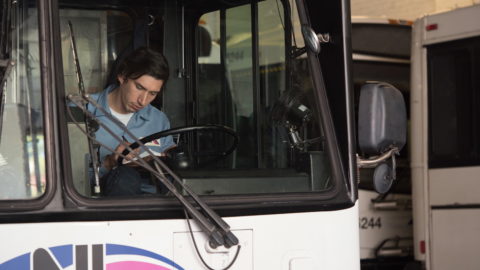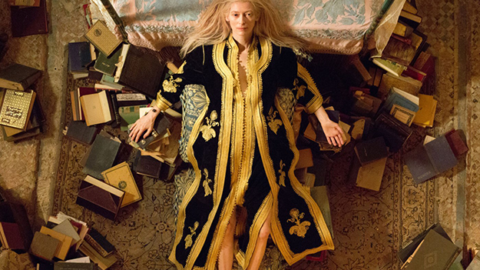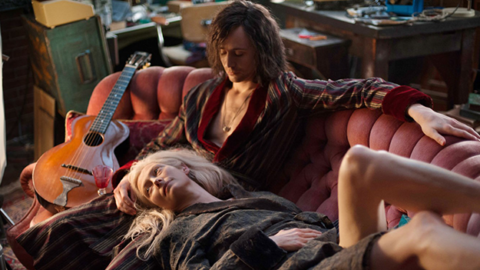Film of the Week: Paterson
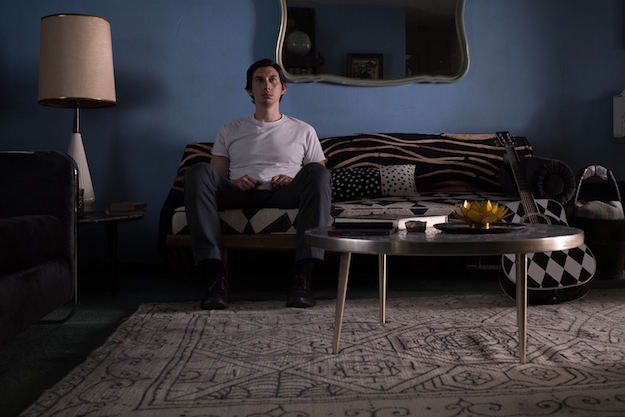
Jim Jarmusch’s last film Only Lovers Left Alive was about the coolest people conceivable—ageless, beautiful, globe-trotting vampires, with a remarkably illustrious social circle of the undead, and a penchant for classic soul records, vintage guitars, and finely bound literature. You might say it was about as elitist as a romance could be. By contrast, his follow-up Paterson explores the everyday, the resolutely unglamorous: it’s about the possibility of ordinary ecstasy in the daily lives of working people. It may be the only comedy ever made about the democratic nature of poetry.
Being a Jarmusch film, it’s a deeply felt work—but it’s also goofily conceptual. Adam Driver plays, what else, a driver—a man who works for NJ Transit, operating a bus in the New Jersey city of Paterson. The character is also named Paterson. Continuing this line of doublings, the film is populated by identical twins who drift into Paterson’s field of vision in the course of a working day—two anxious elderly ladies, two grey-haired men in plaid shirts, two young girls in pink frocks. Perhaps another example of this universal twinning is the (not quite identical) mirror relation between the ordinary world and its image as reflected in poetry. For Paterson is a poet, and his routine, generally uneventful working days are partly devoted to carefully, with delicacy and craft, piecing together verses about the seemingly inconsequential material of his life: a box of matches, a line in a song, the way that molecules shift around him when he walks. Paterson is a hymn to the potential of poetry to unlock the richness of the ordinary; it’s essentially a poem itself.
Set over a single week, the film has a regular, more or less uniform structure, each of Paterson’s days unfolding like a single verse, with occasional significant variations. Each day begins with an overhead shot of him waking up in bed beside the woman who shares his life, artist Laura (Golshifteh Farahani). He walks to work at the bus station, new lines piecing themselves together in his head (heard in voiceover, sometimes seen written on screen). He drives the bus while contemplating the overheard conversations of his passengers. Then he goes home to hear what Laura has been up to during her day—usually decorating their flat in her signature black and white, or making cupcakes for a farmers’ market. After dinner, Paterson takes the couple’s bulldog, Marvin, for a walk and stops by at a bar tended by lugubrious chess-loving Doc (Barry Shabaka Henley), who keeps a Wall of Fame devoted to notable figures associated with the city of Paterson—among them, Dave Prater (of Sam and Dave), children’s entertainer Uncle Floyd, Lou Costello (who has his own park there), and Iggy Pop, who in June 1970 was voted world’s sexiest man by the city’s teenagers. Along the way, we learn about other eminent Patersonians such as Gaetano Bresci, an Italian anarchist weaver who ended up assassinating King Umberto I in 1900. We hear about him from a serious, intense young woman on the bus. Her bespectacled male teenage friend asks her, “Do you think there are any other anarchists still around in Paterson?” She replies, “You mean besides us? Not likely.”
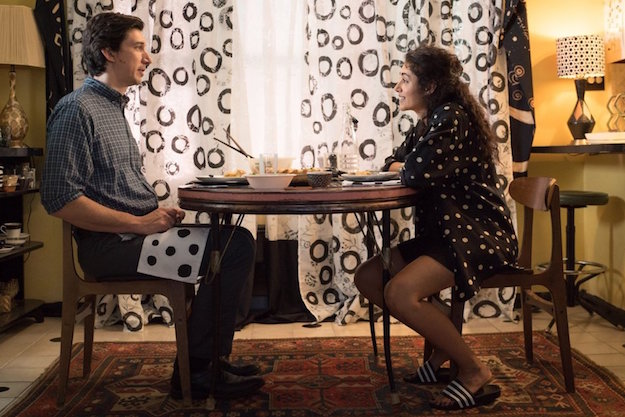
There may not be many anarchists in Paterson, but the city still has its share of poets—including a 10-year girl who, like Paterson the driver, keeps a “secret notebook” full of verse and reads him one of her works, “Water Falls” (“Two words, though”). Paterson is himself a twin of sorts to the American poet William Carlos Williams, whose most famous piece “This Is Just To Say” (1934)—the one about the plums in the refrigerator—is read out here, and forms a kind of template for Paterson’s own verse, written for the film by the poet Ron Padgett. Williams also wrote a long work in five volumes entitled Paterson, a poetic portrait of the city and its people, prepared partly by walking around town and capturing snatches of overheard conversation, as Driver’s character does here. Like Only Lovers Left Alive, one of the most defiantly literary films of recent years, Paterson is a hymn to the glories of writing on paper, but also to the pleasures of the spoken word, both poetic and demotic, and to the rich if not always spectacular joys of the artistic sensibility.
This is sometimes a very funny film, whether it’s purveying jokes as such (Marvin provides a killer deadpan sight gag), or just reveling in the low-key humor of the ordinary, of human oddity. In a wonderful scene, two shlubbish guys on the bus discuss women they fancy but clearly will never date, and a woman by the door seems to shoot them a sourly appraising look as she gets off. Mostly, the film drifts: here and there, we might get a sudden subtle break with the week’s uniformity, as when Paterson’s lugubrious dispatcher Donny (Rizwan Manji) unfurls a litany of his woes. Little episodes and encounters happen, but they aren’t really events; they don’t have payoffs. Paterson comes across a fellow wordsmith, a man rapping in a laundromat; he’s played by Wu-Tang Clan veteran Cliff Smith, aka Method Man, and his rap is about late 19th-century African-American poet Paul Laurence Dunbar (this is a remarkably informative film, and like Only Lovers, a clarion call to further googling). Some guys in a car warn Paterson that a pooch like Marvin could easily get dogjacked; our anxieties are tweaked, but it never happens.
This seems like a world in which crisis is unthinkable: when Paterson’s bus breaks down, he reports to HQ, “I have a situation,” but it’s not what you’d call a situation in any other movie; it’s barely even an incident. There is an incident, however: something startling happens one night among the regulars of Doc’s bar, and Paterson leaps into action. He seems slightly shell-shocked afterwards—a nice jittery modulation in Driver’s otherwise calmly bemused detachment—but even this situation doesn’t have a payoff. The movie’s world seems impervious to trauma, just as in Paterson’s poem about running: “I go through / Trillions of molecules / That move aside / To make way for me…” So it comes as a real surprise when something genuinely disruptive happens late in the film. And yet, even this shock is absorbed into the overall calm and balance of this film’s universe. Life goes on: as one of Paterson’s barroom acquaintances comments, “Another day, right?”
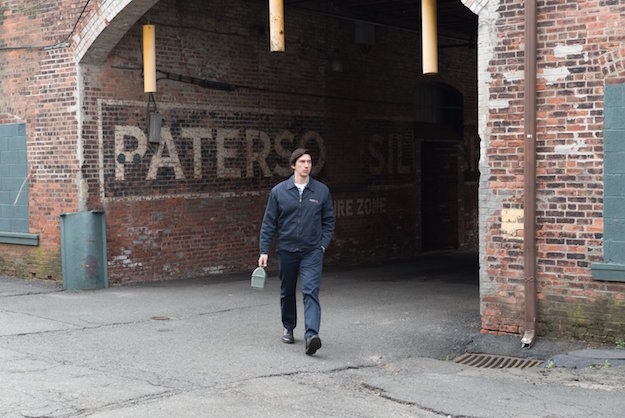
The Zen-inflected Paterson is Jarmusch’s most Japanese film, notwithstanding his quasi-thriller Ghost Dog: Way of the Samurai. An early shot of Paterson drifting slowly and thoughtfully along a leafy path recalls some of the minor-key small-town moments of Hirokazu Kore-eda, and the film’s drama—if it is a drama—resolves itself in Paterson’s meeting, by the city’s famous falls, with a visiting Japanese poetry lover played by Masatoshi Nagase (from Jarmusch’s Mystery Train, recently seen in Naomi Kawase’s oversugared Sweet Bean). The visitor, armed with a copy of Williams’s Paterson, drops a couple more illustrious names—poet Frank O’Hara and Art Brut painter Jean Dubuffet—observes that reading poetry in translation is like taking a shower with a raincoat on, and nods appreciatively when he finds out what Paterson does for a living: “A bus driver in Paterson, New Jersey. Very poetic. This could be poem by William Carlos Williams.”
Paterson itself feels like an attempt, and a very successful one, to approximate Williams’s, or Padgett’s, poetry in film form. It’s a remarkably beautiful, satisfying work: it’s crisply, precisely shot by Frederick Elmes, its images making the most of the ordinary places and faces of a city that may not in reality be as interesting or quietly charming as it seems here. There’s occasionally a little exalted stylistic flourish, as the poetic eclipses the everyday in Paterson’s life: as his poems comes to fruition, we see the Paterson falls, sometimes superimposed with other images, like Paterson’s hand as he writes, and his beloved Laura sleeping.
Laced with a hazy ambient score by Jarmusch’s band SQÜRL, Paterson is steeped in gentle well-being; it seems to propose a model of contemplative, perceptive, responsive life as it should be lived. The life shared by Paterson, Laura, and Marvin seems to be an ideal of everyday romantic happiness. And yet something jars here, and that’s the characterization of Laura—a wildly productive creative spirit, but the one figure in a film sensitive to human oddity who never remotely feels like a living person. Glamorous, tender, endlessly creative, she comes across like a whirlpool of agitated eccentricity: the film constantly returns to her at home, experimenting with various riffs on her signature black-and-white decorative art, whether daubing streaks on a dress she’s making, or punching holes in ribbons, or painting a door frame black. Either that or she’s pursuing other paths of whimsical goofiness: like making a pie with cheddar cheese and brussels sprouts, or setting her heart on a black-and-white Harlequin guitar advertised on TV by faux-Spanish musician Esteban: “In no time at all,” she enthuses, parroting ad-speak, “I could be playing away and realizing my dream—to be a country singer… I have a very strong visual style, as you know.”
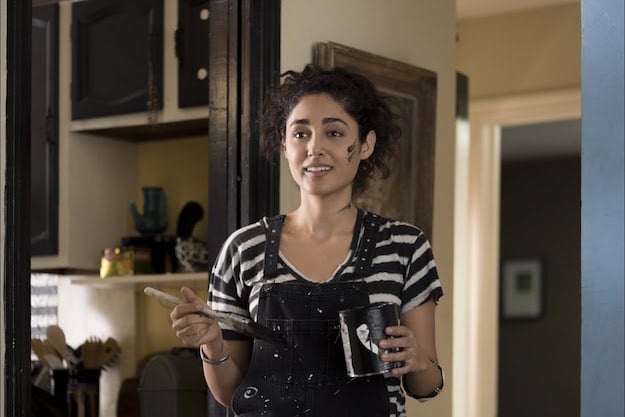
Lively as Farahani’s performance is, Laura doesn’t really add up to much more than a very strong visual style—or a monochrome-themed variant on that irksome archetype (since the term seems these days to be in semi-retirement, I promise this is the last time I’ll ever use it) the Manic Pixie Dream Girl. She’s endlessly, restlessly, exuberantly creative in a way that seems to be offered as a yang to Paterson’s yin—she fills the world, or at least their house, with stuff, while he calmly goes out and transforms what he sees into, as he puts it, “just words. Written on water.” But it’s hard not to see the film as implicitly valorizing his poetic male solemnity as somehow more dignified than Laura’s childlike, excitable over-activity. Apart from her obsessively one-note signature style, and her whimsical desire to try her hand at country music, there’s no one actually here. As with so many MPDG characters, Laura embodies life force, but doesn’t really have a life: does she actually ever leave the house, except once to take her cupcakes to the market?
It’s just possible that we’re supposed to look beyond the surface appearance: perhaps the perfect loving, mutually supportive, creative and domestic relationship that Paterson and Laura enjoy isn’t quite the ideal life it seems. Perhaps, over the course of seven days (and one morning), it’s very heaven, but just imagine any more than that. How long can she possibly go on painting black on white and white on black? Since there’s no backstory here, I couldn’t help thinking that this pair had only moved in together the week before, and that by one week later, they’d have driven each other mad.
Still, Paterson’s single week offers a persuasive manifesto for a contemplative, non-incident-based form of poetic cinema, and for the virtues of poetic sensibility. At one point, Paterson and Laura go to a local cinema to watch Charles Laughton in Island of Lost Souls, but you can’t really see why movies would matter in these people’s lives. Paterson proposes a state of awareness in which every day becomes a movie in itself—of a minimalist, super-intimate, often object-based quality. Not that this is a movie as self-help manual, but Paterson will certainly help you refine your perceptions of the everyday. You will never, for example, think of Ohio Blue Tip Matches in the same way again. I suspect you’ve never thought of them at all. But you will now, and when you do, you’ll think of Paterson too.
Jonathan Romney is a contributing editor to Film Comment and writes its Film of the Week column. He is a member of the London Film Critics Circle.



